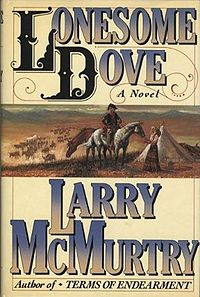The Lonesome Dove Problem
 I have a problem: I’ve already read Lonesome Dove.
I have a problem: I’ve already read Lonesome Dove.
And Lonesome Dove is the most totally absorbing wonderfully awesome novel on the planet.
So nothing else really compares.
Hence, my problem.
I’ve tried to address this problem by waiting a lot of years and then reading Lonesome Dove again. I first read it in fourth grade, when I selected books based on girth (i.e., because I wanted to look impressive reading them); I read it most recently in grad school, when I selected books based on how little they had in common with my area of study (i.e., poetry, which is only sometimes about Texas).
But there’s always the problem of the intervening years, the ones I spend waiting to forget just enough of the details of Lonesome Dove that the re-read is re-suspenseful.
“Why not just watch all the TV on the Internets?” you might offer, helpfully.
Because I already watched it! (Including the 9+ hour Lonesome Dove miniseries!) And besides, I still sometimes like to look impressive, and for that I need a girthy novel.
“Well that shouldn’t be too hard to find!” you might snicker, gesturing to the stack of Norton Anthologies I’m using as a plant stand.
If only pure girth were enough! Alas, I’m no longer the size queen I was in fourth grade; I know I’m still chasing the same Lonesome Dove high, but I’m never sure how/where/in what form to find it.
“Just look for other novels like Lonesome Dove!” you might suggest. Naïvely.
Unfortunately, Lonesome Dove itself is not the most obvious guiding light, because I have almost zero interest in anything it’s actually about. For starters, it takes place in the late 1800s, which is a period in history, which is a class I slept through in high school. Most of the characters are men. The female characters are mostly whores, and they’re usually underpaid. As for plot, it’s pretty much a 900-page cattle drive.
That eliminates other Western period pieces (yawn and phew), but it’s not exactly definitional. What is it, then, that makes a novel so totally absorbing in that epic, elusive Lonesome Dove way?
Zoom out beyond the specifics, and it’s possible to isolate a few basic principles behind Lonesome Dove’s unbeatably awesome amazingness. And lo and behold, it’s also possible to locate said basic principles in other novels which come close—I GUESS—to approximating the utterly absorptive ecstasy of Lonesome Dove: Jonathan Franzen’s The Corrections, Jeffrey Eugenides’ The Marriage Plot*, and Meg Wolitzer’s The Interestings.
Now, these “basic principles” aren’t necessarily the keys to the secret of the Totally Absorbing Novel. And some of them aren’t even particularly…er, principled. Rather, they’re simply my effort to get a little closer to that secret by sussing out some common denominators.
“Get to the basic principles!” you might demand, as a segue.
Well:
- They’re popular, but not too popular. (Like Lonesome Dove. Which is a Western. But won a Pulitzer.)
They’re sold in airports, but they’re bigger and matte finished-er than mass-market paperbacks. They’re featured prominently on displays in Barnes & Noble and indie bookstores alike. And they’re endorsed by Oprah. Sometimes.
What “popular” indicates is a level of ease, accessibility, palatability—these novels aren’t hard; they’re fun. But “not too popular” means they might also be smart, relevant, and reasonably well-written.
- Their plots are secondary at best, annoying at worst. (Did I mention that Lonesome Dove is about a cattle drive?)
In The Corrections, there was that bungled arms deal. No, wait. That was Freedom. The Corrections had…some other kind of bungled deal? Anyway, I know Chip went somewhere, like maybe Latvia…? But I forget why. I mean, I could Google it, but I’d probably just skim the answer.
In Wolitzer’s novel, reverberations from an early incident involving a main character’s brother offer valuable insight into the character’s family and set off at least one important plot point along the way—and yet despite all this, the brother stuff is the least interesting part of The Interestings. His subplot feels plotted, more invented than human, a foil for the more primary characters (i.e., the real people).
The Marriage Plot has perhaps the best excuse for flimsy plotting: namely, its titular meta-reference to a certain subset of Victorian novels, which as a genre are generally plot-lite (or at least, light on plot that doesn’t directly facilitate and/or thwart the central love affair). True to their recent-college-grad nature, Eugenides’ protagonists expend most of their energy finding themselves—a process so (self-) absorbing that external details of “what” and “how” seem somewhat incidental, especially when compared to the almighty “why,” “who” and “when” of coming-of-age.
- They travel, but they’re primarily American. (Like Lonesome Dove, which goes south of the border to steal some cattle but then comes right back to Texas.)
These novels set significant foot in various exotic locales—but their most authentic renderings are of distinctly American landscapes and sensibilities.
Much more memorable than anything that happened in Liberia (was it Liberia?) [Editor’s note: I’m pretty sure it was Lithuania] is The Corrections’ early description of a “salad” that could only be from the Midwest: “water chestnuts and green peas and cheddar-cheese cubes in a thick mayonnaise sauce.” Made for “festive occasions,” no less.
The Interestings jetset all over Europe, but the specifics that stick are pure New York City: its main protagonists’ apartment on the Upper West Side is too small and falling apart and yet still somehow worth it; its resident genius attended—where else?—Stuyvesant High School. (Full disclosure: so did I.)
The Marriage Plot takes a meaningful sojourn to India, but its most precisely depicted and character-defining backdrop is a liberal arts school, a distinctly American phenomenon if ever there was one. And despite all that time spent in Greece, Eugenides’ exquisite descriptions of Detroit—no, wait, that was Middlesex. Never mind.
- They contain whole lives. (Like Lonesome Dove, where the whores weren’t always whores and the cowboys had mothers once, too!)
Even if the chronological narrative is finite and contained, the protagonists in these books are afforded sumptuous, extensive flashbacks, the kind that not only flesh out character, but also build suspense. Want to know who that kid grows up to be? Or why that adult turned out the way he or she did? The absorbing novel connects all the dots, contains all the answers we usually have to wait for. This, I think, is critical to “total absorption,” because it allows us a kind of hind- and/or foresight that is metaphysically impossible in real life. Gratification comes as fast as you can read.
- Not all of their characters are likeable. (Like Lonesome Dove. But I can’t say anymore without giving stuff away. Suffice it to say, them’s some complex cowboys.)
Speaking of those characters…some of them are assholes! But since we see so much of their lives, they’re forgivable, or at least relatable—there are no simple good guys or bad guys here. In each of these novels, varying degrees of omniscient narration allow us glimpses into the characters’ inner lives. Even the unlikeable characters are, in other words, human.
So there you have it, at least so far: my best effort to elevate some novels that aren’t Lonesome Dove to the level of Lonesome Dove. To convince myself that there might be a solution to my problem. That I might one day find even better company than Augustus McCrae and Captain Woodrow F. Call.
Probably not. But in the meantime, does anyone have any girthy novels to recommend?
* NOTE: I didn’t even actually like The Marriage Plot, but I still found it absorbing in a LD-esque way, which is kind of a mystery—are the basic principles of the Totally Absorbing Novel so powerful as to somehow transcend basic likeability?**
** Well, they transcended a cattle drive, so.




